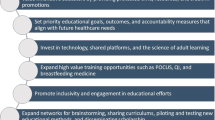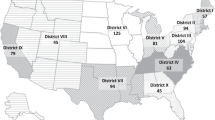Abstract
A successful Neonatal–Perinatal Medicine fellowship (NPM-F) program requires presence and insight of national and institutional supervisory organizations as well as effective program-specific leaders: program director (PD), associate program director (APD), program coordinator (PC), and core faculty. It is becoming more common for PDs and APDs to have advanced training in medical education and conduct medical education research. While NPM-F program leaders benefit from a strong national NPM educator community, they face challenges of increased regulatory burden and unclear national guidelines with variable local interpretation for protected time. National and local organizations can support program leaders and promote their academic success while reducing burnout and turnover by providing leadership training, academic mentoring, and adequate protected time for research and program-specific tasks.
This is a preview of subscription content, access via your institution
Access options
Subscribe to this journal
Receive 12 print issues and online access
$259.00 per year
only $21.58 per issue
Buy this article
- Purchase on SpringerLink
- Instant access to the full article PDF.
USD 39.95
Prices may be subject to local taxes which are calculated during checkout
Similar content being viewed by others
References
ACGME Program requirements for graduate medical education in neonatal-perinatal medicine: Accreditation Council for Graduate Medical Education. 2020. https://www.acgme.org/Portals/0/PFAssets/ProgramRequirements/329_NeonatalPerinatalMedicine_2020.pdf?ver=2020-06-29-162707-410
Specialty-specific references for DIOs: program director scholarly activity: Accreditation Council for Graduate Medical Education (ACGME). 2018. https://staging.acgme.org/Portals/0/PDFs/Specialty-specific%20Requirement%20Topics/DIO-Scholarly_Activity_PD.pdf.
Fellowship program director’s guidebook to the ABP: The American Board of Pediatrics. https://www.abp.org/sites/abp/files/pdf/fellowspdguide17.pdf.
Artino AR Jr., Cervero RM, DeZee KJ, Holmboe E, Durning SJ. Graduate programs in health professions education: preparing academic leaders for future challenges. J Grad Med Educ. 2018;10:119–22.
Artino AR Jr., Konopasky A. The practical value of educational theory for learning and teaching in graduate medical education. J Grad Med Educ. 2018;10:609–13.
Johnston L, Sawyer T, Nishisaki A, Whitfill T, Ades A, French H, et al. Neonatal intubation competency assessment tool: development and validation. Acad Pediatr. 2019;19:157–64.
Gray MM, Edwards EM, Ehret DEY, Brei BK, Greenberg LT, Umoren RA, et al. Resuscitation opportunities for fellows of very low birth weight infants in the Vermont Oxford Network. Pediatrics. 2020;146:e20193641.
French H, Gray M, Gillam-Krakauer M, Bonachea EM, Carbajal M, Payne A, et al. Flipping the classroom: a national pilot curriculum for physiology in neonatal-perinatal medicine. J Perinatol. 2018;38:1420–7.
Goettler C. This year I lied. J Grad Med Educ. 2020;12:392–3.
Education ACoGM. Accreditation Council for Graduate Medical Education (ACGME). 2020. https://www.acgme.org/Portals/0/PFAssets/ProgramRequirements/CPRFellowship2020.pdf.
ACGME Program requirements for graduate medical education in pediatrics: Accreditation Council for Graduate Medical Education (ACGME); 2020. https://www.acgme.org/Portals/0/PFAssets/ProgramRequirements/320_Pediatrics_2020.pdf?ver=2020-06-29-162726-647.
French H, Zucker E, Dadiz R, Johnston L, Gillam-Krakauer M, Falck A, et al. Educational landscape of neonatal-perinatal medicine fellowship programs. American Academy of Pediatrics National Conference and Exhibition, New Orleans, LA; 2019.
Cavazos Montemayorr RN, Elizondo-Leal JA, Ramirez Flores YA, Cors Cepeda X, Lopez M. Understanding the dimensions of a strong-professional identity: a study of faculty developers in medical education. Med Educ Online. 2020;25:1808369.
Section on Neonatal Perinatal Medicine: American Academy of Pediatrics. 2021. https://services.aap.org/en/community/aap-sections/sonpm/.
About ONTPD: American Academy of Pediatrics. 2021. https://services.aap.org/en/community/aap-sections/sonpm/ontpd/about-ontpd/
French H, Eichenwald E. The maturation of a proficient neonatologist: from the delivery room to independent practice. Pediatrics. 2020;146.
APPD LEAPES: Association of Pediatric Program Directors. 2021. https://www.appd.org/resources-programs/educational-resources/appd-leapes/.
Hartzell JD, Yu CE, Cohee BM, Nelson MR, Wilson RL. Moving beyond accidental leadership: a graduate medical education leadership curriculum needs assessment. Mil Med. 2017;182:e1815–e22.
Narayan AP, McPhillips HA, Anderson MS, Gardner L, Larrabee J, Poynter S, et al. Strengthening the associate program director workforce: needs assessment and recommendations. Acad Pediatr. 2014;14:332–4.
O’Connor AB, Halvorsen AJ, Cmar JM, Finn KM, Fletcher KE, Kearns L, et al. Internal medicine residency program director burnout and program director turnover: results of a national survey. Am J Med. 2019;132:252–61.
Expected Time for Program Director: Accreditation Council for Graduate Medical Education (ACGME). 2019. https://www.acgme.org/Portals/0/PDFs/Specialty-specific%20Requirement%20Topics/DIO-Expected_Time_PD.pdf.
Review and comment: common program requirements for review and comment: Accreditation Council for Graduate Medical Education (ACGME). 2021. https://www.acgme.org/What-We-Do/Accreditation/Review-and-Comment.
ACGME Common Program Requirements (Fellowship); Accreditation Council for Graduate Medical Education (ACGME). 2020. https://www.acgme.org/Portals/0/PFAssets/ProgramRequirements/CPRFellowship2020.pdf.
Author information
Authors and Affiliations
Consortia
Contributions
MGK and JS wrote the primary draft; MGK, JS, PM, and EB performed revisions; all authors reviewed the final manuscript.
Corresponding author
Ethics declarations
Competing interests
Consortia authors declare the following competing interests: MG has received sponsored research agreement funding from Astarte Medical Partners and Takeda Pharmaceuticals. PC has received funding from Elsevier publishing and MedStudy. None of these sources had any role in this manuscript. All Authors are involved in Neonatal–Perinatal Medicine fellowship program leadership.
Additional information
Publisher’s note Springer Nature remains neutral with regard to jurisdictional claims in published maps and institutional affiliations.
Rights and permissions
About this article
Cite this article
Gillam-Krakauer, M., Sharma, J., Myers, P. et al. Part 6: Essentials of Neonatal–Perinatal Medicine fellowship: program administration. J Perinatol 42, 976–981 (2022). https://doi.org/10.1038/s41372-022-01314-8
Received:
Revised:
Accepted:
Published:
Version of record:
Issue date:
DOI: https://doi.org/10.1038/s41372-022-01314-8



